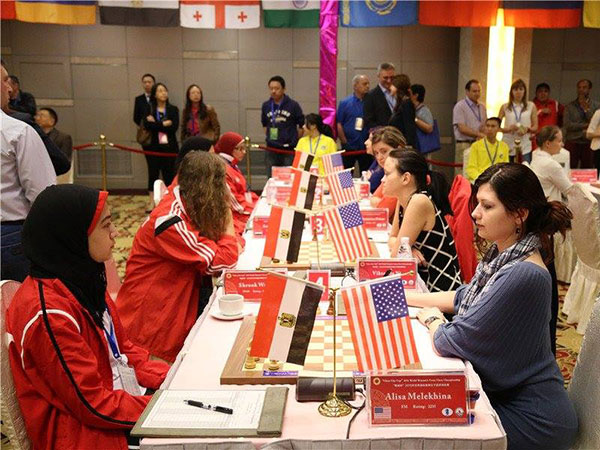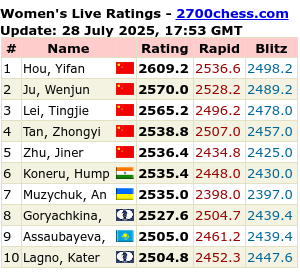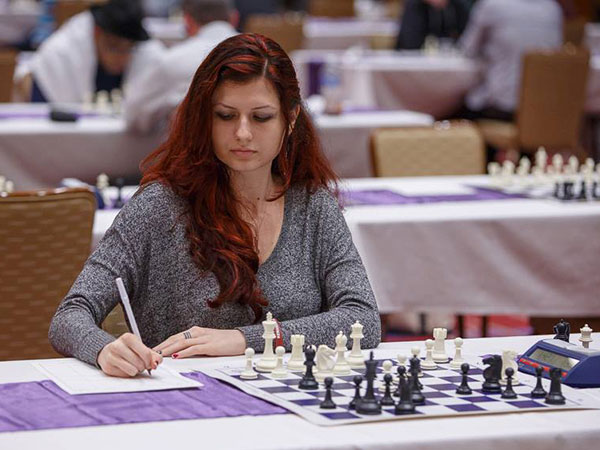What's in a label?
The challenge for women chess players extends beyond the board. We are often the subject of complaints that the quality of our play is low, our games are plagued by blunders, and we have an overall poor understanding of the game.
Such pronouncements about and against “women’s chess” are often heard. In an article titled “Girl Power in Chess” during the elite tournament in Baden Baden, Germany, last April, grandmaster Grigory Serper lauded Hou Yifan, who was leading the tournament at the time, and Judit Polgar, the retired super-grandmaster. Then — in what I consider a genuine attempt at praise — he added, “The progress of women’s chess is amazing if you consider the quality of the following game played in the women’s world championship less than 80 years ago.” The follow-up was an admittedly embarrassing game in which Annabelle Lougheed lost to Vera Menchik in 1939 in 14 moves after ending up down a rook.
Playing through the above game was a reminder of Bobby Fischer’s famous remark that he could beat any woman with knight odds.
Covering the same tournament and Hou’s commendable performance for The Guardian, Leonard Barden wrote that her “results against [Fabiano] Caruana and [Magnus] Carlsen were a landmark for “women’s chess.”
Both uses of the term “women’s chess” in those articles were benign. However, they suggest that the term “women’s chess” has become a real concept. Indeed, the label propagates an imaginary subspecies of chess that can be ascribed only to women. The epithet has evolved to describe, and thus validate, an alternate state of reality in which women play a game wholly different from regular “chess.”
Unfortunately, the term “women’s chess” is misleading and counterproductive to efforts to actually promote women’s participation in chess.

Melekhina at the World Team Championship in Chengdu, China, 2015. | Photo: Yupeng Liu
“Women’s chess” is an outgrowth of women-only chess tournaments and titles, which are artificial creatures of the chess world. Like many epithets accumulated through outdated and persistent usage, its meaning is not well understood. Whereas “women’s gymnastics” or “women’s figure skating” make sense because the female competitors are (i) confined to competing only against other women, (ii) have exclusive rankings relative only to other women, and (iii) are scored based on completely different physical techniques than those employed by men, chess is different: Women play by the same rules as men and with the same pieces and boards.
Let's stick to Elo

What about describing chess in the context of the strength of the players? This seems more within the realm of the meaning of “women’s chess.” It makes sense to have a concept of “grandmaster chess” or “2700 chess” (for those elite players rated over 2700), particularly if used in comparison to a lesser degree of chess strength played by “beginner chess.” Here, the qualifier to “chess” denotes the type or quality of chess in relation to the strength of the players.
To use the “women’s” qualifier in the same regard would signify that women possess a certain type or quality of chess exclusive to women, meaning that women innately play chess differently than men. But women play in all types of styles. Polgar is regarded as one of the greatest attacking players, male or female. The past three United States Women’s Champions — Sabina Foisor (2017), Nazi Paikidze (2016), and Irina Krush (2015) — are primarily positional players, particularly Paikidze. Hou has a more universal approach.
Another reason that women are routinely thought of as less skillful chess players is that there are so few who are among the world’s elite. But the percentage of grandmasters who are women — a bit more than two percent — is somewhat comparable to the number of women who are rated by the World Chess Federation — less than 10 percent. A well-respected theory suggests that if the overall participation rate of women rose, their representation among grandmasters would catch up.
More importantly, women-only tournaments, even those that are limited to the top female players, have a significantly lower overall average rating than the averages in top tournaments in which men compete. For example, the average rating of the 2017 United States Women’s Championship was approximately 2295, compared to 2685 in the open section.
Games in which players are rated 2300 obviously are of a lower quality than games between players who are rated 2700. To describe the games between the players who are 2300 as “women’s chess” is misleading and unfair — they play like 2300s, not like women. If there were side-by-side tournaments featuring men of comparable ratings, it would be natural to expect the same quality of play in both tournaments.
The proper comparison to make between women and men would be to compare the play of masters to that of grandmasters, which would be a gender-neutral analysis. Instead, women get labeled with a disparaging term based on the numerosity of women participants playing at and against a lower rating level, rather than comparing any characteristic inherent to women.
Kings vs. Queens, the experiment

A more accurate assessment of whether women have an innate style proper for the label of “women’s chess” would require a prolonged study comparing games between men and women, controlling for equal rating strength. The closest to such an experiment was the Kings vs. Queens match hosted by the Chess Club and Scholastic Center of St. Louis in September 2011. The organizers carefully handpicked male and female players for each five-member team that would correspond as closely as possible in rating; the average of both teams was 2476. The match was a double round-robin consisting of both rapid classical and rapid chess 960 games.
In the ten rounds, the queens scored only 18½ match points while the kings scored 31½ points. So far, that was the first and last match like that. One data point — especially one that omits classical slow games that constitute the basis for the ratings in the first place — is hardly enough to draw supportable conclusions; there would need to be a significant sample of studies or matches. But this format had the right idea of how to more precisely measure male vs. female performance in chess.
(L-R) Kings: Nakamura, Stopa, Arnold, Finegold, Cao; Queens: Krush, Kosteniuk, Lahno, Fierro, Zatonskih | Photo: SaintLouisChessClub.org
The topic will always be a charged one, as are all discussions relating to female advancement. In order to continue having productive conversations, it is best to use language that does not arise from and propagate a misconception — that there is something called “women’s chess.” The label has settled into chess parlance, but its usage is a disservice to the inherent meritocracy of chess that all players appreciate. There is not a separate, enclosed bubble of “women's chess” that is separate from regular “chess.” Chess is chess.
On this DVD, well-known Indian WGM Tania Sachdev shows you how to evaluate certain positions and then find the right concepts and plans on the basis of her own games.



























